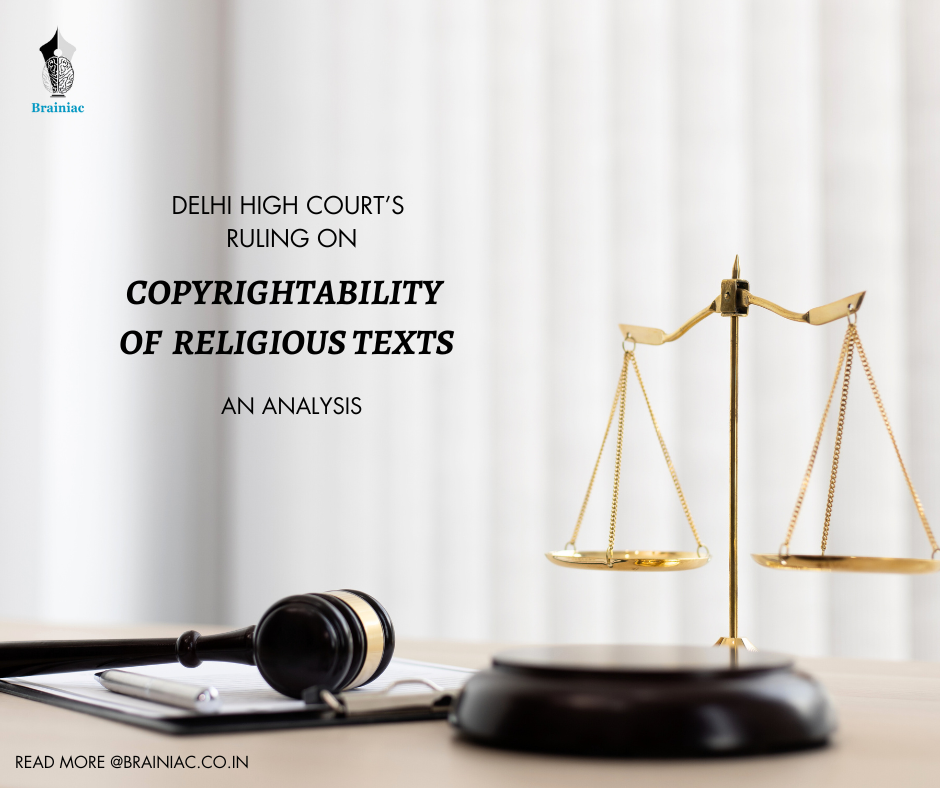Introduction
In a recent and significant legal ruling, the Delhi High Court has addressed a complex issue related to copyright protection, specifically focusing on adaptations and derivative works based on religious scriptures. The case centered on the Bhaktivedanta Book Trust and its claims of copyright infringement, shedding light on the intersection of copyright law and religious texts.
The Matter at hand
The Bhaktivedanta Book Trust, established under the visionary leadership of Srila Prabhupada, the founder of the International Society for Krishna Consciousness (ISKCON), found itself at the center of a legal dispute over copyrights. Srila Prabhupada was renowned for his commitment to simplifying religious scriptures, making them more accessible to a diverse readership through his books and lectures. The trust asserted its claim that the copyright for these works, initially held by Srila Prabhupada, had been legally transferred to their stewardship following his passing in 1977.
The Trust’s Allegations
The core argument presented by the Bhaktivedanta Book Trust was that their copyrighted works, which were adaptations and simplifications of religious texts, were being infringed upon. They accused several online entities, including websites, mobile applications, and Instagram accounts, of distributing their copyrighted content without authorization.
Court’s Analysis
Justice Prathiba M Singh, after careful consideration, made several critical observations and rulings:
The Delhi High Court affirmed that religious scriptures themselves, being part of the public domain and cultural heritage, cannot be copyrighted. However, adaptations and derivative works based on these scriptures are indeed eligible for copyright protection under the Copyright Act, 1957. This interpretation reaffirms the distinction between the original texts and their creative adaptations. Furthermore, the court found that the defendants had engaged in piracy by reproducing the copyrighted works in their entirety. These reproductions extended beyond mere translations of verses; they included summaries, introductions, prefaces, and cover designs. This comprehensive replication was considered copyright infringement, with the court emphasizing the potential financial harm this could cause to the copyright holder. Lastly, in response to the copyright infringement, Justice Singh issued an ex-parte interim injunction against the defendants, prohibiting them from using the copyrighted material. Additionally, the court directed tech giants Google and Meta to promptly remove applications and pages hosting the copyrighted content. To reinforce these actions, the court called on relevant authorities to enforce blocking orders against the flagged websites.
Analysing the Ruling through the Lens of the Copyright Act, 1957:
The Delhi High Court’s landmark ruling holds substantial implications for copyright law in India, particularly in the context of religious and cultural texts. This ruling aligns harmoniously with the foundational principles enshrined within the Copyright Act, 1957, which governs copyright protection in the nation. It underscores critical facets of this legal framework:
Striking a Delicate Balance: The ruling adeptly balances the imperative of preserving religious texts in the public domain, respecting their cultural significance, with the imperative of safeguarding creative endeavours and intellectual property rights linked to adaptations. This equilibrium aligns seamlessly with the Copyright Act’s overarching goal of shielding original creative expressions while facilitating the use of materials in the public domain.
Vigorous Enforcement of Copyright: The court’s decision to issue an interim injunction and enforce removal and blocking orders underscores the Copyright Act’s unwavering commitment to protecting the rights of copyright holders. It underscores the essential need for robust enforcement mechanisms, particularly in an era dominated by digital proliferation and the unauthorized dissemination of copyrighted content.
The Digital Platform’s Role: The directive to tech giants like Google and Meta to expeditiously remove infringing content underscores the pivotal role digital platforms play in the realm of copyright enforcement. This aligns seamlessly with the Copyright Act’s recognition of the responsibility borne by intermediaries in preventing copyright infringement.
Conclusion
In summation, the Delhi High Court’s recent ruling not only serves to clarify the nuances of copyright protection in the context of adaptations of religious scriptures but also provides valuable insights into the interpretation and application of the Copyright Act, 1957. It emphasizes the imperative of striking an equitable balance between safeguarding the interests of copyright holders and preserving the sanctity of public domain materials, all while ensuring stringent enforcement measures in the digital landscape. This precedent-setting decision will undoubtedly leave an enduring mark on future copyright cases in India, particularly those that grapple with issues surrounding religious and cultural texts.


